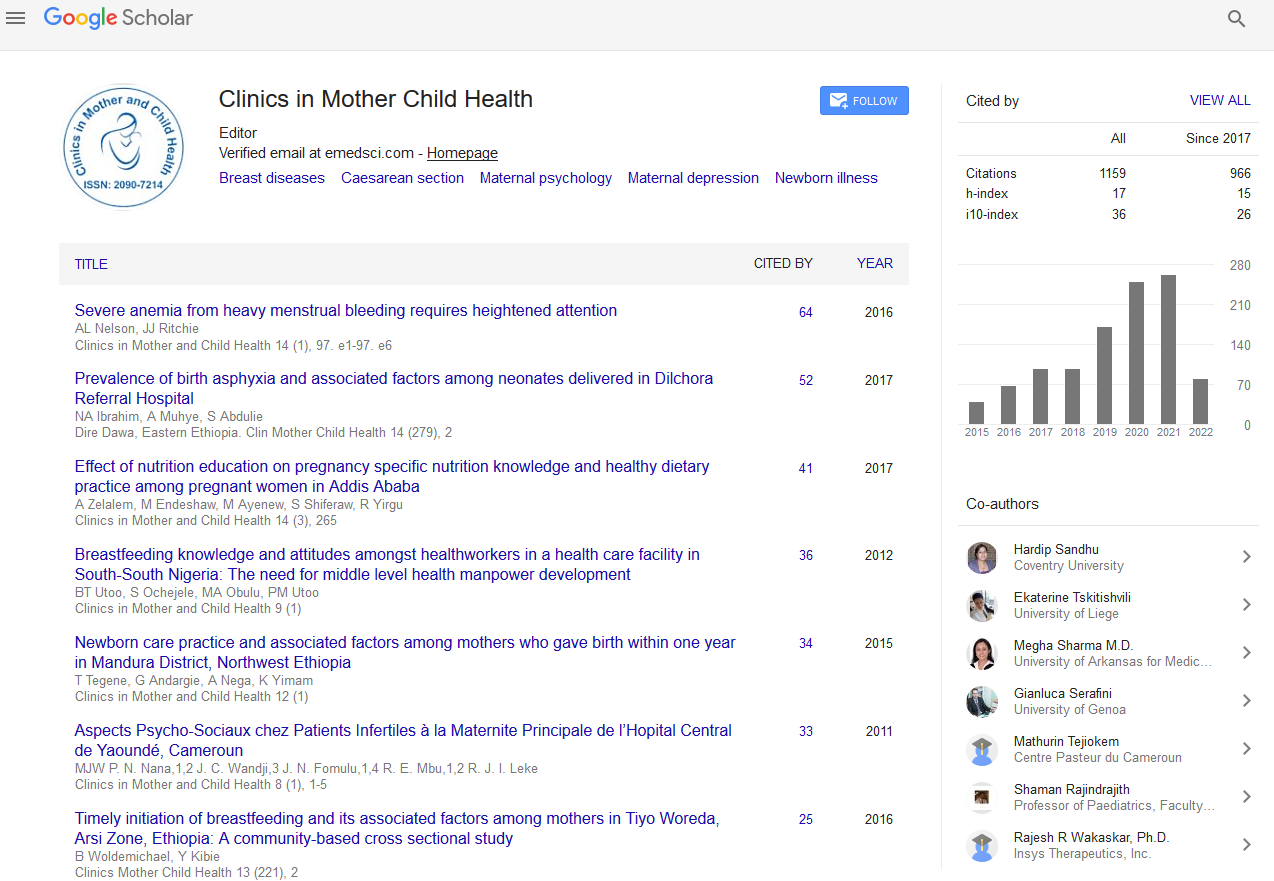Indexed In
- Genamics JournalSeek
- RefSeek
- Hamdard University
- EBSCO A-Z
- Publons
- Geneva Foundation for Medical Education and Research
- Euro Pub
- Google Scholar
Useful Links
Share This Page
Journal Flyer

Open Access Journals
- Agri and Aquaculture
- Biochemistry
- Bioinformatics & Systems Biology
- Business & Management
- Chemistry
- Clinical Sciences
- Engineering
- Food & Nutrition
- General Science
- Genetics & Molecular Biology
- Immunology & Microbiology
- Medical Sciences
- Neuroscience & Psychology
- Nursing & Health Care
- Pharmaceutical Sciences
Editorial - (2021) Volume 0, Issue 0
Pregnancy Complication in Patients with Paroxysmal Nocturnal Haemoglobinuria
Ievgeniia Burlaka*Received: 05-Aug-2021 Published: 26-Aug-2021, DOI: 10.35248/2090-7214.21.s8.e005
Description
Paroxysmal nocturnal haemoglobinuria is a genetic disorder characterized by chronic symptoms that usually require supportive therapy. The disorder is caused by a mutation in the phosphatidylinositol glycan A gene.
A new treatment strategy that involves the use of a monoclonal antibody known as eculizumab has been discussed. This treatment can decrease the complement-mediated haemolytic process and improve the quality of life of patients with hemophilia A.
Although there is a small chance of pregnancy complications due to pulmonary neurogenic disorder (PNH), these risks can still lead to major medical complications. Despite the existence of studies on PNH, these findings show that it can be safely treated during pregnancy.
Paroxysmal nocturnal haemoglobinuria (PNH) may be a rare haematological disease with an incidence of 1:100 000 to 1:500 000per year. It’s presented with triad of anaemia, bone marrow (BM) failure, and thrombosis. There are often noted variations within the PNH symptoms in several individuals. Sometimes, PNH are often quite asymptomatic and thus it's important to rule out the presence of this disorder in uncertain cases of hemolytic, thrombosis or cytopenia. PNH primarily affects adults including women of reproductive age. Although the disease includes chronic symptoms, spontaneous remissions are known to happen in certain cases also.
PNH in pregnant women may end in increased risks leading to complications for both mother and fetus with higher chances of maternal and fetal mortality rates. As such, the high incidence of thrombotic complications with maternal complications while 40% accounts to fetal loss.
Thrombosis and haemolysis are the foremost common explanation for fetomaternal morbidity and mortality. Maternal mortality associated with Thromboembolism ranges from 5.8-20.8%. Thrombosis affected the pregnant women during the post-partum period while the cases affected during the antenatal or intrapartum period With the high incidence during the postpartum period, the Budd-Chiari syndrome (also referred to as vena hepatica thrombosis) is taken into account because the common thrombotic complication related to pregnancy
Anaemia is more severe in PNH pregnant woman than within the non-pregnant woman with increased transfusion requirements throughout the pregnancy. Moreover, thrombocytopenia is another common complication leading to the reduction of platelet count to <50x109/l.
The proper management of PNH patients during pregnancy necessitates supportive treatment to regulate the most clinical manifestations of the disease. However, not many specialized options are available to regulate hemolytic during pregnancy. Despite long-term toxicity of chronic steroidal therapy arising thanks to the continuous use of steroids, they were widely used for acute hemolytic crises. RBC transfusion in pregnant women with PNH is inspired to maintain the hemoglobin level above 8g/dL. Transfusions not only elevate the hemoglobin level, but also suppress marrow production of complement sensitive RBCs during an episode of continued haemoglobinuria.
Taking into consideration the huge loss of iron through urine, iron overload is typically not a transfusion-related complication in patients with PNH. A number of the recent studies have noted successful pregnancy results using eculizumab therapy. Clinical trials in PNH patients have shown that eculizumab reduces the transfusion requirement and improves the standard of life. The primary open-label experimental study conducted to guage the security and efficiency of eculizumab involved 11 patients and proved that blocking C5 may cause the reduction in hemolytic in PNH patients.
However, increased dosing and frequency of infusions was necessary for the right management of pregnancy in such condition. The outcomes were in consensus with the previous studies and no adverse fetal outcomes were noted with eculizumab exposure.
Citation: Burlaka I (2021) Pregnancy Complication in Patients with Paroxysmal Nocturnal Haemoglobinuria. Clinics Mother Child Health. S8:e005.
Copyright: © 2021 Burlaka I. This is an open-access article distributed under the terms of the Creative Commons Attribution License, which permits unrestricted use, distribution, and reproduction in any medium, provided the original author and source are credited.


